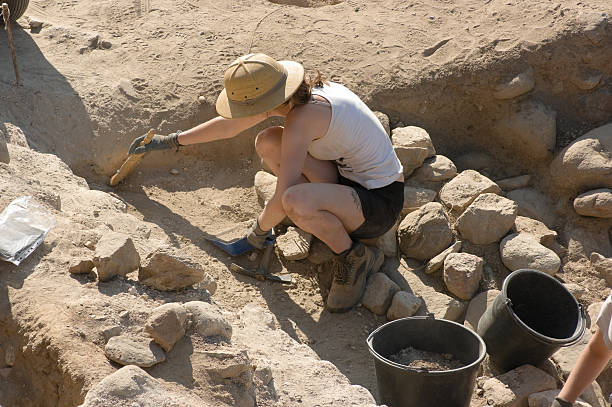
As the old saying goes, “history repeats itself,” which means that a knowledge of history can help you better understand the modern world and predict shifts before they occur.
For this reason, many who study history note that their degree allows them to learn about those in the past but gives them a richer understanding of current societal trends and human behavior.
Luckily, this knowledge applies to a range of careers and industries.
Keep reading to learn more about the best jobs for history majors!
Why Enter into the History Field?
History majors explore topics like politics, architecture, art, and human behavior throughout the past.
Therefore, earning a history degree qualifies graduates for a variety of career opportunities in libraries, schools, universities, museums, or in the field.
The following are some of the most common career paths for history majors:
1. Archivist

Why Become an Archivist?
With an average annual salary of around $58,000 and almost a 15% job growth, archivists are tasked with the organization and classification of ancient artifact tracking and record-keeping using detailed databases.
Within the museum industry, archivists have a monumental job of tracking all artifacts that come through their doors, especially in major museums.
Curators build collections by acquiring artifacts and artwork for instruction and archivists systematically organize all those exhibits.
Archivists also appraise and research different artifacts so having a historical background is essential to classification.
| Archivist Key Stats | |
|---|---|
| Education | 4+ Years |
| Outlook | 14.7% |
Read the full career guide: How to Become an Archivist
2. Anthropologist

Why Become an Anthropologist?
With an excellent salary of around $67,000 per year and a 4% future growth outlook, anthropologists conduct research on the customs, cultures, origins, and connections humans have with each other.
This is accomplished by collecting, researching, and evaluating information about humankind, so a history degree is critical in this field.
Within their daily work, anthropologists work in a multidisciplinary, flexible, and holistic field where they can utilize critical thinking skills to find the underlying reasons for human behavior.
| Anthropologist Key Stats | |
|---|---|
| Education | 4+ Years |
| Outlook | 3.9% |
Read the full career guide: How to Become an Anthropologist
3. Archeologist

Why Become an Archeologist?
Those looking to enter the archeology field can get into field-related or research-based specializations.
While excavations are only one aspect of archaeology, you can also specialize in specific objects like becoming a numismatist, who is an expert on coins, or an epigraphist, who can decipher inscriptions.
Also, many cities and countries employ archaeologists to maintain monuments or work in museums.
Furthermore, archeologists can enter academia by becoming professors or giving different lecture types.
With an above-average annual salary of $67,000 per year and a 4% future job growth, archeologists have a passion for history and the world.
| Archeologist Key Stats | |
|---|---|
| Education | 4+ Years |
| Outlook | 3.9% |
Read the full career guide: How to Become an Archeologist
4. Librarian

Why Become a Librarian?
With a history background, most students have developed excellent capabilities for finding information and analyzing related sources.
In the field, librarians utilize these skills to assist patrons with finding research books, resources, content, and other publications while answering their questions.
In this role, you will also be responsible for creating databases for institutions and patrons, curating collections based on various topics, teaching patrons how to use different resources and tools, and offering educational programs.
If you decide to pursue a librarian career, you could work for a public organization, specialized institution, university, or school.
With a respectable average salary of $62,000 per year and a 9% job growth prediction, becoming a librarian can be a lucrative and rewarding career.
| Librarian Key Stats | |
|---|---|
| Education | 4+ Years |
| Outlook | 9% |
Read the full career guide: How to Become a Librarian
5. Writer

Why Become a Writer?
With an average salary of around $74,000 per year and a 7.6% future job growth, writers get paid for their passion and storytelling abilities.
Many writers have a background in history, which helps create a more accurate and detailed story.
As a writer, you can take many career paths, including the author of a historical fiction, TV scriptwriter, researcher for a movie, or deliver content for digital audiences or specific prints.
You may even write a biography on a famous individual or become a speechwriter for CEOs or politicians.
Having skills in communicating, writing, and researching, and a knowledge of historical facts gives you an edge as a writer.
If you are currently in college, always work with your college TV station, radio, magazine, or newspaper and complete internships to present your body of work to potential employers.
| Writer Key Stats | |
|---|---|
| Education | 4+ Years |
| Outlook | 7.6% |
Read the full career guide: How to Become a Writer
6. Historian

Why Become a Historian?
The most obvious career path of history majors is to become a historian who studies information from artifacts and texts, prepares books or reports on specific topics, advises on perseveration methods, and ties historical developments together.
In this profession, you will develop and master many skills learned while working toward your degree including analyzing and researching information and presenting and writing about historical topics.
Historians can work for individual employers, nonprofit organizations, government agencies, and private businesses.
In addition to an average salary of almost $70,000 per year and 6.1% future job growth, historians often travel extensively since they are required to analyze artifacts or original documents.
Although historians work behind the scenes for prominent figures, they still publish books, give presentations, and provide guidance to professional groups.
If you become a historian, you can specialize in specific historical topics, geographical areas, or periods, or serve as an expert within these niches.
| Historian Key Stats | |
|---|---|
| Education | 4+ Years |
| Outlook | 6.1% |
Read the full career guide: How to Become a Historian
7. History Professor

Why Become a History Professor?
If you enjoy explaining historical concepts to an audience and have strong leadership skills, then using your history degree to enter academia may be a great option.
History teachers work at all levels of the educational system, so you could work as a history professor at a private or state university or as a high school teacher in a private or public school.
University professors make around $82,000 per year on average and enjoy 11% future growth, which equates to job security.
History professors meet with students in small groups, give lectures, and have private office hours to answer questions.
They also advise students on goals and academic progress while pursuing history-related research that is often published in reputable industry magazines and databases.
| History Professor Key Stats | |
|---|---|
| Education | 4+ Years |
| Outlook | 11% |
Read the full career guide: How to Become a History Professor









